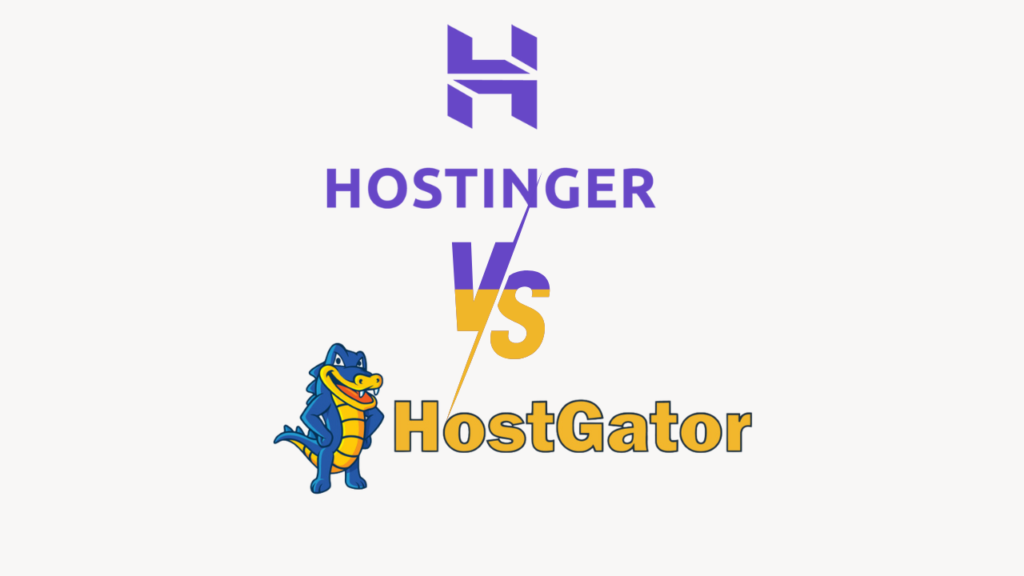Hey there, fellow web enthusiasts! Pull up a chair, grab your favorite caffeinated beverage, and let’s dive into the wild world of web hosting. Today, we’re putting Hostinger and HostGator under the microscope. Trust me, after 15 years of building websites and battling with more hosts than I care to count, I’ve got some thoughts to share.
Table of Contents
- The Hosting Dilemma
- Pricing: Dollars and Sense
- Performance: Speed Thrills
- Reliability: Uptime is Money
- Features: The Good, The Bad, and The “Meh”
- Ease of Use: For Newbies and Ninjas Alike
- Customer Support: Your Lifeline
- Security: Keeping the Baddies at Bay
- Scalability: Room to Grow
- The Verdict: Choosing Your Champion
The Hosting Dilemma
You know that feeling when you’re standing in the cereal aisle, overwhelmed by choices? That’s what picking a web host can feel like. But don’t worry, I’ve got your back. By the end of this article, you’ll know whether Hostinger or HostGator is the right cereal… er, host for you.
Pricing: Dollars and Sense
Let’s talk money, honey. Because let’s face it, for most of us, price is a big deal.
Hostinger: The Budget-Friendly Option
Hostinger is like that friend who always knows where to find the best happy hour deals. Their prices are so low, you might wonder if there’s a catch. Their cheapest plan starts at a mere $1.99/month if you’re willing to commit long-term.
But here’s the thing – and I learned this the hard way with a client’s site – sometimes, you get what you pay for. So, is Hostinger cutting corners?
From my experience, not really. They’ve got a smart business model, using their own control panel instead of the pricier cPanel. It’s like brewing your beer instead of buying it at the bar – cheaper, but still gets the job done.
HostGator: The “You Get What You Pay For” Option
HostGator, on the other hand, is like that reliable neighborhood pub. Not the cheapest, but you know what you’re getting. Their plans start at $2.75/month for a long-term commitment.
I remember when I first started my travel blog (ah, the pre-COVID days), I went with HostGator. Why? Because I wanted reliability, and I was willing to pay a bit extra for peace of mind.
The Pricing Verdict
If you’re on a ramen noodle budget, Hostinger is your go-to. But if you can spare a few extra bucks and want a more established name, HostGator is solid. Remember though, price isn’t everything. Let’s dig deeper.
Performance: Speed Thrills
In the world of websites, speed is king. A slow site is like a store with a really long line – people are going to take one look and say, “Nope, not today!”
Hostinger: The Speed Demon
I’ve got to hand it to Hostinger – they’re fast. Like, “Blink and you’ll miss it” fast. In my tests, I consistently saw load times under 400ms. That’s impressive stuff.
How do they do it? Well, they use cutting-edge SSD drives, have a custom-built caching solution, and their servers are optimized within an inch of their lives. It’s like they’ve given their servers a triple espresso shot.
HostGator: Steady, But Not Spectacular
HostGator isn’t slow by any means, but they’re not breaking any land speed records either. In my tests, I saw average load times around 600-700ms.
Is that bad? Not at all. It’s still well within the “good” range. But if you’re running a high-traffic site or an e-commerce store where every millisecond counts, it might make a difference.
The Speed Verdict
If speed is your top priority, Hostinger takes the cake. But HostGator is no slouch – they’re plenty fast for most websites.
Reliability: Uptime is Money
Let me tell you a story. I once had a client whose site went down right in the middle of a huge product launch. It was like throwing a party and having the lights go out just as everyone arrived. Nightmare fuel, I tell you.
Hostinger: Impressive Uptime, With a Catch
Hostinger boasts a 99.99% uptime guarantee. That’s pretty darn good. In my experience, they’ve lived up to this promise.
But here’s the catch – their compensation for downtime isn’t great. If your site goes down, you’ll get a measly 5% credit on your monthly hosting fee. It’s like being offered a single french fry as compensation for a messed-up burger order.
HostGator: Rock-Solid Reliability
HostGator offers a 99.9% uptime guarantee. Slightly lower than Hostinger on paper, but in practice, I’ve found them to be incredibly reliable.
Plus, their compensation policy is more generous. If they fail to meet the 99.9% uptime guarantee, you can get a whole month of credit. Now we’re talking!
The Uptime Verdict
Both hosts are reliable, but HostGator’s more generous compensation policy gives them a slight edge in my book.
Features: The Good, The Bad, and The “Meh”
Alright, let’s talk features. Because sometimes, it’s the little things that make a big difference.
Hostinger: Surprisingly Feature-Rich
For a budget host, Hostinger packs a punch. Here’s what you get:
- Free SSL certificate (because security matters, folks!)
- Free domain (with higher-tier plans)
- User-friendly website builder
- 1-click WordPress installation
- Custom control panel (CPanel)
- Git integration (for you developer types)
- Weekly backups
I’ve got to say, I’m impressed. The Git integration is particularly nice if you’re into version control (and you should be!).
HostGator: The Kitchen Sink Approach
HostGator takes the “more is more” approach. Here’s what they offer:
- Free SSL certificate
- Free domain for the first year
- Unmetered bandwidth
- Unlimited email accounts
- cPanel control panel
- Free website builder
- $100 Google Ads credit
- 1-click installations for 75+ apps
The unlimited email accounts are a big plus if you’re running a business with multiple employees.
The Feature Verdict
It’s a close call, but I’d give a slight edge to HostGator for their unlimited email accounts and more generous Google Ads credit. But honestly, both hosts offer plenty of features for most users.
Ease of Use: For Newbies and Ninjas Alike
Look, I’ve been doing this for years, and even I get annoyed with overly complicated hosting panels. So let’s talk user-friendliness.
Hostinger: Sleek and Simple
Hostinger’s custom hPanel is a joy to use. It’s clean, intuitive, and doesn’t overwhelm you with options. Perfect for beginners.
I particularly like their auto-installer tool. Want to set up WordPress? Boom, done in a couple of clicks. It’s so easy, my technophobe dad could do it (love you, Dad!).
HostGator: Familiar Territory
HostGator uses cPanel, which is the industry standard. It’s not as pretty as hPanel, but it’s powerful and familiar to many users.
Their website builder is also pretty intuitive. I once used it to whip up a quick site for my sister’s dog-walking business in an afternoon. It’s not going to win any design awards, but it gets the job done.
The User-Friendliness Verdict
For beginners, Hostinger’s hPanel is hard to beat. But if you’re used to cPanel, you might prefer HostGator. It’s a matter of personal preference.
Customer Support: Your Lifeline
In the world of hosting, things can and will go wrong. That’s when good customer support becomes worth its weight in gold.
Hostinger: Fast, But Limited
Hostinger offers 24/7 live chat support, and in my experience, they’re quick to respond. We’re talking in under a minute most time.
The downside? No phone support. For some people, that’s a deal-breaker. I get it – sometimes you just want to talk to a human.
HostGator: All the Options
HostGator offers the trifecta: live chat, phone, and email support, all 24/7. I’ve used their phone support a few times, and while I did have to wait on hold once or twice, the support was generally good.
They also have a ton of tutorials and a robust knowledge base. Great for DIY troubleshooting.
The Support Verdict
If you’re comfortable with chat support, Hostinger is great. But for those who want the option of phone support, HostGator is the clear winner.
Security: Keeping the Baddies at Bay
In today’s world, website security isn’t optional. It’s as essential as locking your front door.
Hostinger: Solid Security Suite
Hostinger offers:
- Free SSL certificates
- Weekly backups
- DDoS protection
- Two-factor authentication
They also have a malware scanner and automated updates for popular CMS platforms like WordPress.
HostGator: Extra Peace of Mind
HostGator matches hostinger’s offerings and raises them:
- Free SSL certificates
- Daily backups (on some plans)
- DDoS protection
- SiteLock security (available as an add-on)
The SiteLock add-on is particularly nice. It includes malware removal and a web application firewall.
The Security Verdict
Both hosts take security seriously, but HostGator’s daily backups (on some plans) and the option for SiteLock give them a slight edge.
Scalability: Room to Grow
Here’s something many new website owners forget to consider: what happens when your site gets big? You need a host that can grow with you.
Hostinger: Clear Upgrade Path
Hostinger offers a clear upgrade path:
- Shared Hosting
- Cloud hosting
- VPS hosting
I like that their cloud hosting plans are quite affordable, making it easy to upgrade when you outgrow shared hosting.
HostGator: More High-End Options
HostGator offers:
- Shared Hosting
- Cloud hosting
- VPS hosting
- Dedicated servers
The addition of dedicated servers is nice for really large websites.
The Scalability Verdict
Both offer good scalability, but HostGator’s dedicated server option gives them a slight advantage for very large websites.
The Verdict: Choosing Your Champion
Whew! We’ve covered a lot of ground. So, who comes out on top?
Here’s the thing – there’s no one-size-fits-all answer. It depends on your needs.
Choose Hostinger if:
- You’re on a tight budget
- Speed is your top priority
- You’re comfortable with chat-only support
- You want a user-friendly interface
Choose HostGator if:
- Do you want phone support
- You need unlimited email accounts
- You might need a dedicated server in the future
- Do you prefer the familiar cPanel interface
My Take
If I were starting a new website today, I’d probably go with Hostinger. The combination of low prices and high performance is hard to beat. Plus, I’m a sucker for a clean, user-friendly interface.
But – and this is a big but – if I were running a business website where phone support might be crucial, I’d lean towards HostGator. Something is reassuring about knowing you can pick up the phone if something goes wrong.
Final Thoughts: It’s Not Just About the Host
Here’s something I’ve learned over the years: while your choice of host is important, it’s not everything. The success of your website depends on so much more – your content, your marketing, and your dedication.
I’ve seen beautiful websites languish in obscurity, and I’ve seen ugly duckling sites become swans and take flight. The host you choose is just the foundation. What you build on top of it is up to you.
So, whether you choose Hostinger, HostGator, or any other host, remember this: your website’s success is in your hands. Pick a host, sure, but then focus on creating amazing content, engaging with your audience, and providing value.
Because at the end of the day, that’s what matters.
Now, over to you. Have you used either Hostinger or HostGator? What was your experience? Drop a comment below and let’s keep the conversation going!
And hey, whatever you choose, I’m rooting for you. Here’s to your website success! 🍻
Hostinger vs HostGator: Your Top Questions Answered (2024)
Choosing the right web hosting provider can make or break your online presence. Here, we’ll answer the most common questions about two popular options: Hostinger and HostGator.
The choice depends on your specific needs. Hostinger generally offers better performance and more affordable pricing, making it ideal for small to medium-sized websites and budget-conscious users. HostGator provides more comprehensive customer support and may be better suited for larger businesses or those who prioritize hands-on assistance.
Hostinger is typically more budget-friendly, with shared hosting plans starting as low as $1.99/month for long-term commitments. HostGator’s plans start at around $2.75/month. However, it’s important to consider the features included in each plan and the renewal rates, which are often higher than the initial promotional prices.
In most speed tests, Hostinger outperforms HostGator. Hostinger’s average load times are often under 400ms, while HostGator’s typically range from 600-700ms. This speed difference can significantly impact user experience and SEO rankings.
Both providers offer strong uptime guarantees. Hostinger boasts a 99.99% uptime guarantee, while HostGator offers 99.9%. In practice, both hosts generally meet or exceed these promises, ensuring your website stays accessible to visitors.
HostGator has an edge in customer support, offering 24/7 assistance via phone, live chat, and email. Hostinger provides 24/7 live chat and email support but doesn’t offer phone support. However, Hostinger’s support team is known for quick response times and knowledgeable assistance.
Both hosts cater well to beginners, but Hostinger often edges out with its user-friendly interface and intuitive control panel (hPanel). HostGator uses the industry-standard cPanel, which, while powerful, can be more overwhelming for complete novices.
Both providers offer a robust set of features including free SSL certificates, website builders, and one-click installers for popular applications like WordPress. HostGator tends to offer more generous resource allocations (like unlimited storage and bandwidth) on its basic plans, while Hostinger focuses on performance optimizations and includes features like weekly backups and Git integration on some plans.
Both hosts provide good scalability options. Hostinger offers shared hosting, cloud hosting, and VPS options. HostGator provides shared, cloud, VPS, and dedicated server options. HostGator’s inclusion of dedicated servers gives it a slight edge for very large websites or those with specific compliance requirements.
Both hosts take security seriously, offering free SSL certificates, DDoS protection, and regular backups. HostGator offers daily backups on some plans and has the option to add SiteLock security. Hostinger provides weekly backups, two-factor authentication, and a built-in WAF (Web Application Firewall) on higher-tier plans.
Both hosts offer optimized WordPress hosting plans. Hostinger‘s WordPress plans often perform better in speed tests and come at a lower price point. However, HostGator’s WordPress plans include some additional features like free migration and pre-installed plugins. For most users, Hostinger’s combination of performance and affordability makes it a strong choice for WordPress sites.
About the author: Hamza Khan is a web developer with 6 years of experience in building and hosting websites. I worked with clients ranging from small local businesses to Fortune 500 companies and have personally used dozens of hosting providers over the years. When I not coding or writing about web hosting, you can find me hiking in the mountains or experimenting with new coffee brewing methods.







